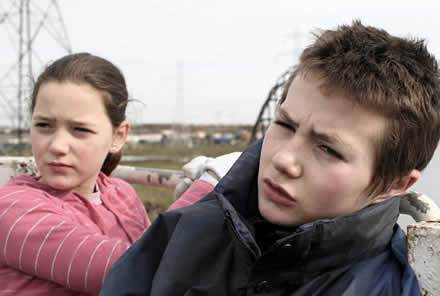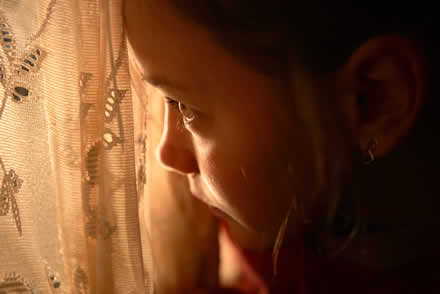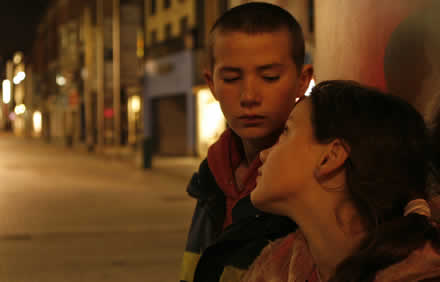 Kisses is the story of two young runaways living on the fringes of Dublin who discover both beauty and danger in the big city. Kylie lives with 5 siblings and an overworked mother. Next door, Dylan is growing up with an abusive father and the memory of his runaway brother. One day, after a violent altercation with his father, Dylan and Kylie flee. Together they make their way to the magical lights of downtown Dublin to search for Dylan’s brother and the hope of a new life. Dublin, as shown through the innocent eyes of our young protagonists, is a kaleidoscope of magic, wonder and mystery. But as the night wears on, Dublin takes on a darker character and the two children learn that they have to rely on the kindness of strangers and the sagely wisdom of Bob Dylan to persevere.
Kisses is the story of two young runaways living on the fringes of Dublin who discover both beauty and danger in the big city. Kylie lives with 5 siblings and an overworked mother. Next door, Dylan is growing up with an abusive father and the memory of his runaway brother. One day, after a violent altercation with his father, Dylan and Kylie flee. Together they make their way to the magical lights of downtown Dublin to search for Dylan’s brother and the hope of a new life. Dublin, as shown through the innocent eyes of our young protagonists, is a kaleidoscope of magic, wonder and mystery. But as the night wears on, Dublin takes on a darker character and the two children learn that they have to rely on the kindness of strangers and the sagely wisdom of Bob Dylan to persevere.
We had the opportunity of interviewing Lance Daly (Last Days in Dublin, The Halo Effect) about his brilliant film, Kisses that will be in US screens in July.
Bijan Tehrani: What was your initial motivation in making Kisses and how did you come up with its idea?
Lance Daly: I think I was just asking myself questions about what I though about kids growing up in tough surroundings and at what stage do they come to realization that they will mirror the place that they are from. So I decided that I wanted to tell a story of two young characters who decide to run away before they succumb to their fate. 
BT: Is Kisses based on any real experience of your life or something that you have observed?
LD: Yeah, I mean it’s a personal film and there are some things in there that are relevant to me and my observations in life. Eventually the true stories become fiction but there are always elements that are specific to your own life.
BT: For an audience, this is a new discovery of Dublin and it presents a new image of the city, was it your initial intent?
LD: I always wanted to find a new perspective of the town; I grew up in the center of the city so I know it well and the picture postcard image of the city so I felt that it was important to find something that was a little bit different.
BT: One of the brilliant points of kisses is the performance of the two kids. How did you go about casting the film and how did you work with your young actors?
LD: We went around all of the schools in Dublin and we saw thousands of kids, we eventually made a short list and we were able to narrow it down to Kelly and Shane Curry, who was the only boy that came in that I thought, was strong enough to deal with Kelly Every day. Many scenes we were very disciplined and they did the words as they were written and proved that they were really great actors. There were other scenes like the canal scene, where we just let them play and they found a little bit of life, so this scene was much more improvised.
 BT: So how has your background as an actor, a musician and a photographer helped you in making this film?
BT: So how has your background as an actor, a musician and a photographer helped you in making this film?
LD: If you’re a director you end up using every single trick you ever learned in every discipline and the photography was important because the camera is a large part of filmmaking.
BT: The ending of Kisses is very interesting because the kids learn about themselves but yet they return to the same problems that they were living with; what was your intent with this ending?
LD: I didn’t want the ending to be sugarcoated and I thought that it had to be realistic and I felt that the realistic end was that if you are a runaway in a city like Dublin then you realize that it is not always a happy ending. At the same time I wanted it to be real but also feel like it in fact was a happy ending. I think it shows that the kids have something between them that will help them get through the bad stuff.
BT: Will you continue to write your own screenplays?
LD: Well I would like to if I can because I feel that it is important for the screenplay to come from your own perspective, but I just finished a film that I did not write and it was nice to let someone else to do some of the hard work.
BT: How did you come up with the visual style of the film?
LD: I just wanted the audience to view the world from the perspective of the characters and to allow them to see how the characters change as the story goes on, transforming the scenes from black and with to color.
BT: Do you have any future project lined up?
LD: Yes I just finished a film called the Good Doctor with Orlando Bloom.

